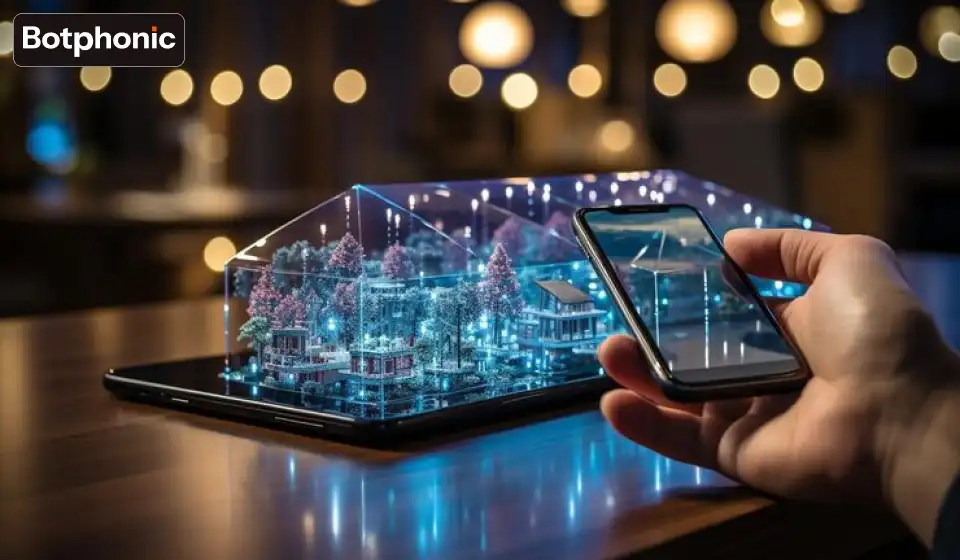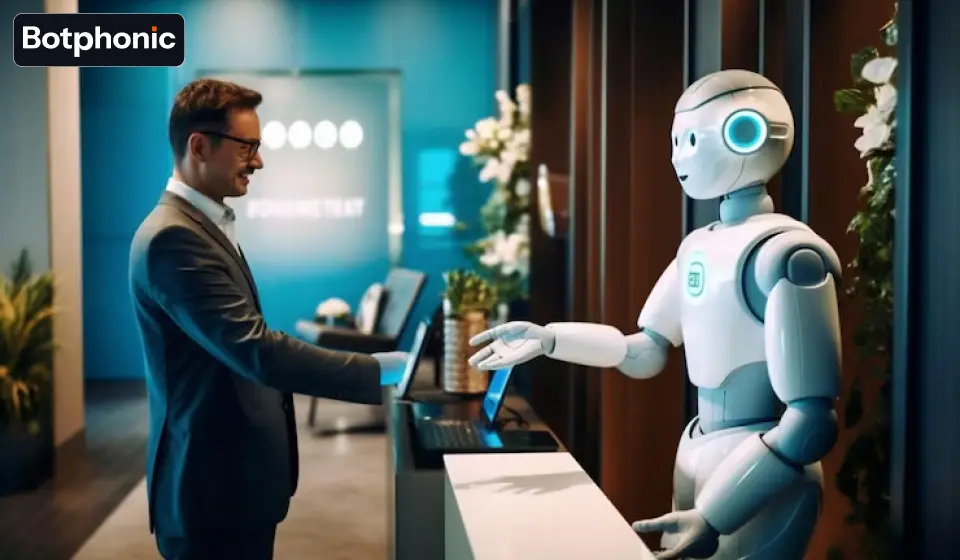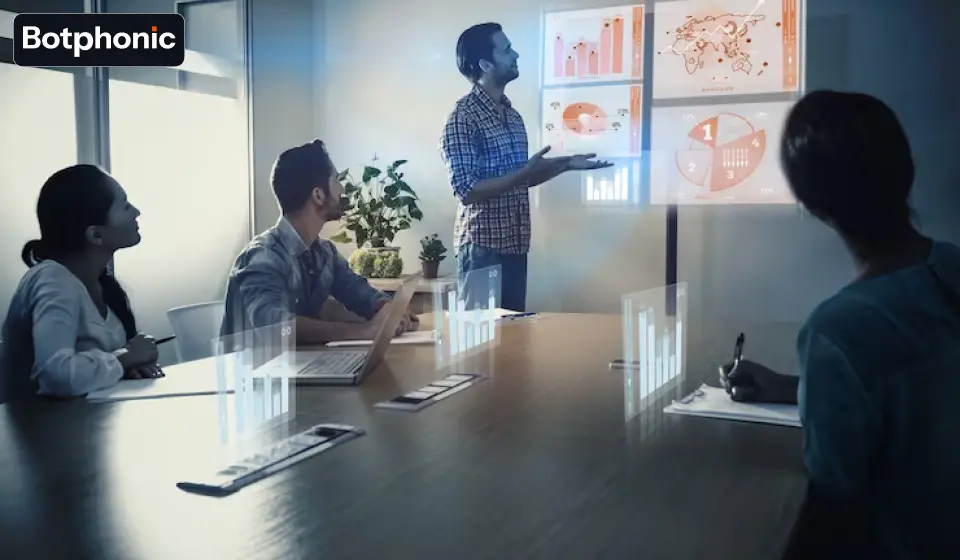
Summarize Content With:
Quick Summary
Hearing a lot of AI receptionists this, AI receptionists that, and wondering if there’s any real-world example of an AI receptionist in action? Don’t think too much, in this blog, we will be uncovering about:
- What an AI receptionist is?
- Its key characteristics and core functions
- Why are businesses adopting AI receptionists?
- 5 real-life examples of AI receptionists.
- The future trends of AI receptionists
Introduction
Imagine there’s a helper who is increasing your operational efficiency while reducing costs? Did it? Now open your eyes and wake up to reality, with advanced technology and having machine learning as core functionalities, AI receptionist have been discovered. It’s kind of an AI call assistant, or you can say a virtual receptionist answering service.
AI receptionists are managing to sway various factors with their impressive features of automation and managing repetitive tasks easily. With voice and chat capability and seamless integration into CRM and other tools makes it one of the most used tools by numerous industries.
What is an AI receptionist?
A virtual assistant runs with the help of artificial intelligence, which is capable of performing numerous tasks such as answering calls, appointment scheduling, and managing inquiries.
Key Characteristics
- Voice and Chat Capabilities: Manages phone calls and online chats.
- Automation: Handles repetitive tasks such as FAQs and lead qualification.
- 24/7 Availability: It can operate around the clock as per users’ needs.
- Integration: Works in cooperation with calendars, CRM systems, and other relevant tools.
Core Functions
- Call Handling: Answers, records, or helps with call forwarding.
- Appointment Scheduling: Integrates with calendars.
- Lead Capture: Collects consumers’ details and qualifies leads.
- Multilingual Support: Makes communication easier with multilingualism.
- Smart Escalation: Directs complex queries to a human agent.
Learn more: our beginner’s guide
How are AI Receptionists Becoming Businesses’ Favourite?
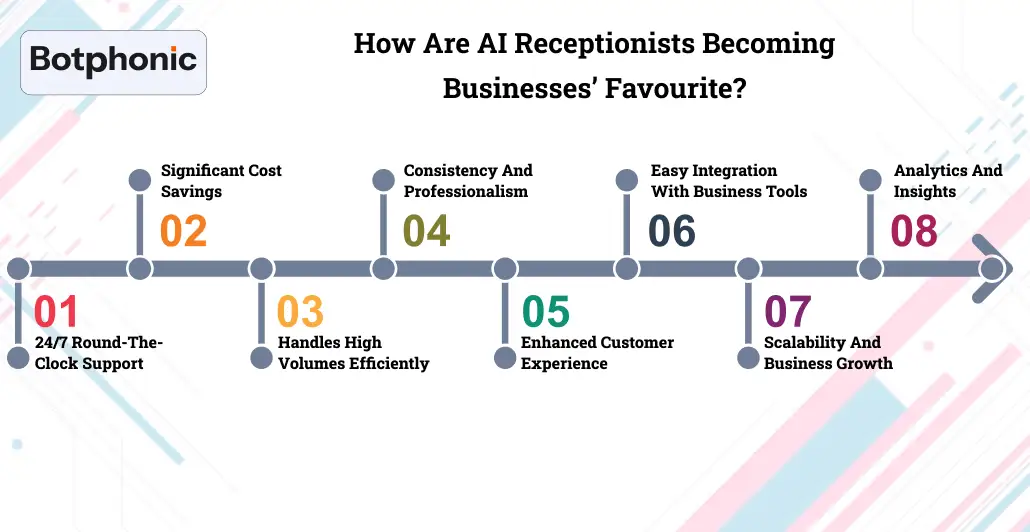
AI receptionists are rapidly helping businesses grow and also becoming their favourite. Furthermore, it’s not just making work easier but is also helping face critical operational challenges, all while focusing on improving customer experience.
1. 24/7 Round-the-clock Support
- During traditional times, receptionists used to work limited hours, but as time goes on, customers are expecting support even at midnight.
- AI receptionists are there to provide round-the-clock service, managing calls, chats, and even inquiries.
2. Significant Cost Savings
- Hiring and training new human receptionists can be time-consuming and expensive.
- AI receptionists reduce overhead costs by eliminating salaries and benefits.
3. Handles High Volumes Efficiently
- During seasonal times, human receptionists are bound to get overwhelmed with a sudden increase number of calls.
- AI receptionists are made to manage unlimited calls simultaneously, ensuring there are no missed opportunities.
4. Consistency and Professionalism
- Sometimes there are bad days or errors during the call made by human receptionists.
- Although AI ensures a consistent service and provides standardized greetings along with multilingual support.
5. Enhanced Customer Experience
- Incorporating NLP, AI helps build trust by sounding natural and engaging.
- Offers features like personalized greetings, multilingual support, and quick response time too.
6. Easy Integration with Business Tools
- AI receptionists integrate with booking tools, CRMs, and other apps.
- Provides seamless scheduling, lead tracking, and follow-up.
7. Scalability and Business Growth
- Businesses can scale with increased customer communications, without requiring any additional staff.
- Suitable for startups and SMBs who aim to grow.
8. Analytics and Insights
Shares data, such as call volumes, inquiries, and conversion rates, which helps businesses grow and optimize their operations effectively.
AI receptionists combine efficiency, availability, and improved customer service, which makes them the best alternative to human receptionists. For modern businesses across industries, AI call assistant helps effectively automate their operations and lessens the workload of human staff.
Real-Life Examples of AI Receptionists
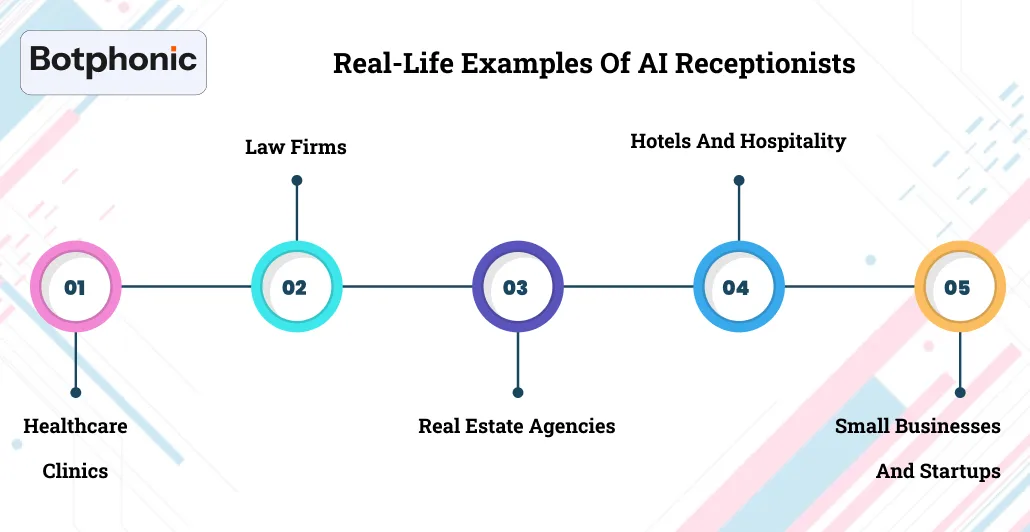
AI receptionists are efficiently revolutionizing the way businesses are handling their customers now. With automated scheduling and lead management, they are effectively meeting customers’ needs and also increasing their growth. Here we have 5 real-life examples of AI receptionist in action.
1. Healthcare Clinics
In healthcare, AI receptionists help manage appointments and even help with prescription refills and reminders.
Real-World Example
A small-scale clinic integrated Botphonic AI receptionist into its existing appointment system. This AI receptionist integration helped patients by operating around the clock and responding to calls or messages 24/7 to schedule or reschedule the appointment. It helped the clinic with:
- Reduce missed appointments effectively
- Frees human staff to focus on queries that need a human touch
- Improves patient satisfaction with faster and quality responses.
2. Law Firms
Legal practices use an AI receptionist to route client calls and schedule consultations to help provide initial client details without having to compromise with confidentiality.
Real World Example
Botphonic helped a law firm started with the implementation of an AI receptionist in their system to screen calls and also help schedule meetings for lawyers. With this, it resulted in reduced phone congestion during peak hours and ensured that the clients were quickly directed. It helped in:
- Streamlining the client intake process.
- Minimizing lost calls and missed opportunities.
- Maintaining confidentiality even while automating routine communication.
3. Real Estate Agencies
Having an AI receptionist helps real estate agencies streamline property inquiries and coordinate showings to help qualify leads automatically.
Real-Life Example
A real estate agency deployed our AI receptionist for their operational productivity, which helped them answer property-related questions via phone and chat. Prospective buyers were able to check the showing and could instantly book, while AI helped them by collecting their preferences and contact information. With this, it effectively helped:
- Increase their lead conversion by 26% due to faster follow-up.
- Reduce administrative workload
- Ensure the timely responses are shared with prospective buyers.
4. Hotels and Hospitality
AI receptionists allow hotels to offer guest service 24/7, such as reservation booking or handling multilingual inquiries.
Real-Life Example
A hotel implemented Botphonic AI in its workflow management to handle late-night booking calls and other guest inquiries. Guests could even request services and confirm reservations while serving them in multiple languages, whatever they are comfortable with. It impacted in:
- Improved guest satisfaction
- Reduced frontdesk workload
- Enabled consistent service throughout the day.
5. Small Businesses and Startups
Small businesses and startups can employ an AI receptionist to offer a professional service around the clock without going out of budget.
Real-Life Example
A startup tech company deployed an AI receptionist in its workplace to manage incoming calls and customers’ online chats. The receptionists greeted them and also qualified leads based on the pre-set criterion. It enabled them to:
- Focus on product development rather than on calls.
- Reduced overall costs by mitigating the need for a full-time receptionist.
- Ensured that the customers’ interactions were handled appropriately.
Key Benefits Highlighted by These Examples
- Consistency: Delivers a uniform response and minimizes the risk of human error.
- Availability: Offers consistent 24/7 support.
- Cost savings: Reduces staffing needs while maintaining professionalism.
- Efficiency: Reduced overload by managing repetitive tasks.
- Customer Satisfaction: Quick responses and personalized interactions.
Future of AI Receptionists
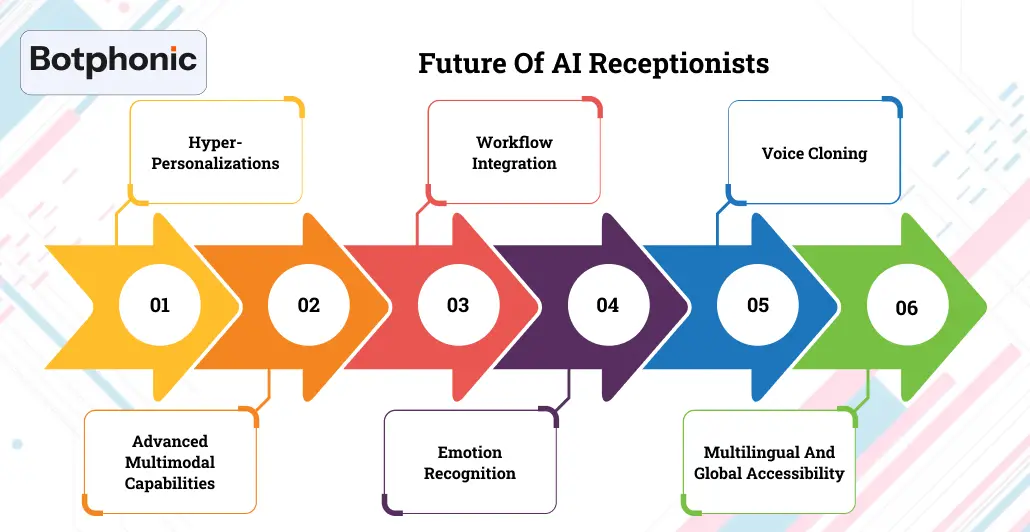
AI receptionists are reforming front-desk operations effectively, but their evolution is just the tip of the iceberg. Advancements in AI, automation, and conversational technology are shaping something that will become even smarter.
- Hyper-Personalizations: Offering personalized responses and recommendations based on previous interactions made with customers.
- Advanced Multimodal Capabilities: For richer interactions, AI receptionists interact with the customer via voice, chat, and even through video.
- Workflow Integration: Future AI receptionists will be able to integrate more effortlessly with ERPs, CRMs, and scheduling tools.
- Emotion Recognition: With emotion AI, the receptionist will easily be able to detect tone and sentiment to respond promptly.
- Voice Cloning: Next-gen AI receptionist will be able to use human-like voice cloning, which sounds more natural, friendly, and related to your brand.
- Multilingual and Global Accessibility: Businesses that are going to expand globally will require multilingual AI receptionists who are capable of real-time translation.
The future of AI receptionists relies on intelligence, personalization, and active interactions that almost cover the line between human and machine support.
Experience 24/7 efficiency with AI-powered reception
Get started today.Conclusion
AI receptionists are effectively optimizing every chance where you can have a potential customer. Integrating an AI receptionist in your workflow will efficaciously assist you in your growth. No matter if it was just a call for your business hour details, or a person who was interested in your service, they all will get a prompt and uniform answer
As per stats, AI has increased businesses’ productivity by 66%. Incorporating an AI receptionist in your business is no longer an option but has become something very essential. Across various sectors such as healthcare, law firms, real estate, hotel, and more, AI receptionists are assisting them with their workflow management.
